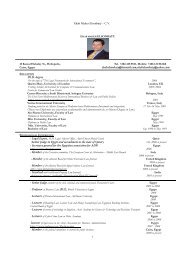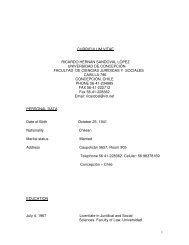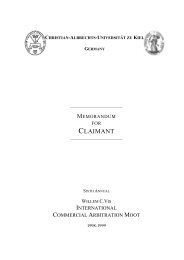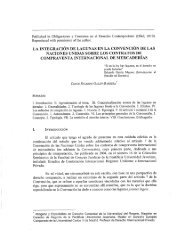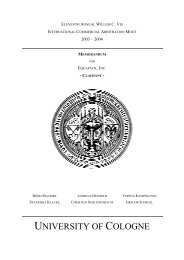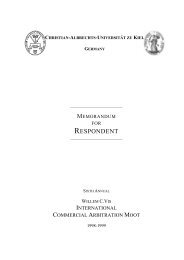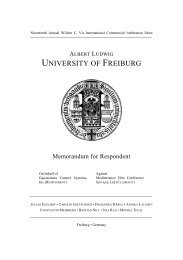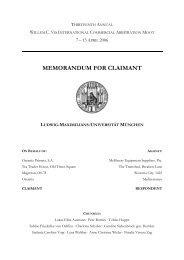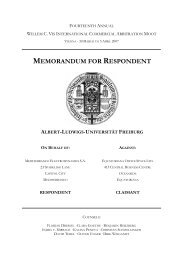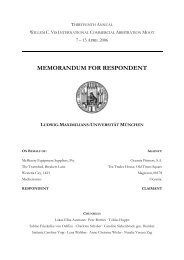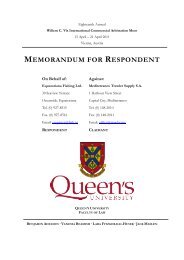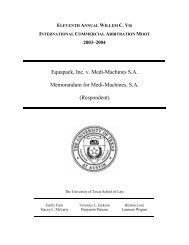CLAIMANT 0800 FINAL 12072006
CLAIMANT 0800 FINAL 12072006
CLAIMANT 0800 FINAL 12072006
You also want an ePaper? Increase the reach of your titles
YUMPU automatically turns print PDFs into web optimized ePapers that Google loves.
(PRC)]. At the time of contracting, the obligor “must be expected to assure himself by all normal<br />
and reasonable methods that there is no impediment to his performance” [Stoll in Schlechtriem98 609<br />
ref. McRae (Aust.)]. The Fuse Policy, underlying any theory of exemption, had been in place since<br />
July 2003 [Cl. Ex. 4]. A prudent businessperson in Respondent’s situation would have been aware<br />
of the Fuse Policy through the “normal and reasonable” method of accessing the Equalec website or<br />
by contacting knowledgeable parties (see supra 50).<br />
C. Respondent could reasonably be expected to have overcome Claimant’s lack of<br />
complaint or its consequences.<br />
80. Even if Respondent could not have taken the lack of complaint into account beforehand,<br />
Respondent could reasonably be expected to have “overcome it or its consequences” [Art. 79(1)<br />
CISG; see also Tallon 581]. The test here must be “very strict” [Stoll/Gruber 817]. The promisor must<br />
overcome an impediment in order to perform even when this results in greatly increased costs [id.;<br />
see also Piltz 165; Staudinger/Magnus 783; Arb. No. 155/1994 (Rus.)]. “[A] party who is under an<br />
obligation to act must do all in his power to carry out his obligation and may not await events which<br />
might later justify his non-performance” [Secretariat Art. 65 7]. After the closure of the Suez Canal,<br />
for example, English courts ruled that going around the Cape of Good Hope instead was not<br />
“commercially or fundamentally different” and therefore could reasonably be expected of the<br />
promisor [Tsakiroglou (U.K.) cited in Stoll/Gruber 817; see also Berman63 1420-4]. Far less is asked here.<br />
At least two reasonable measures were available to Respondent: Respondent could have complained<br />
to the Commission on its own (1) and Respondent could have provided timely substitute goods (2).<br />
1. Respondent itself could reasonably have complained to the Commission.<br />
81. An appeal to the Commission about Equalec’s refusal to connect the Fuse Boards lacked sufficient<br />
merit or time to succeed (see supra 75). To whatever extent Commission complaint could have<br />
succeeded, Respondent could have initiated it. The record is silent as to what if any criteria limit<br />
who may complain to the Commission. Some countries use a “concrete” model of regulatory<br />
enforcement that requires petitioners to have actual interests at stake, whereas others allow<br />
“abstract” review [Reitz 1132-6; Utter 592-3]. Respondent’s potential liability in the case at issue<br />
allows it to meet even the more restrictive “concrete” review requirement. Even an informal inquiry<br />
might have resolved the Fuse Policy issue [Clar. Q. 30].<br />
2. Respondent could reasonably have provided timely substitute goods.<br />
82. Respondent could reasonably have avoided the consequences of any impediment by making a<br />
30



